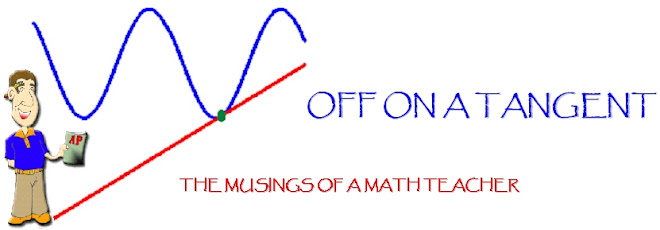
Where does it come from?
From France, of course!!! But serially here, anxiety manifests itself in many different ways. Some students get jittery and flush-faced, while some look calm, pale, and catatonic, resigning themselves to poor performance. Some race through tests and assignments, in the same sense that we rip band-aids off as quickly as possible. Others avoid it as much as they possible can as if math were brussel sprouts . . . with sauerkraut on top. But however it manifests itself, math anxiety is truly unpleasant, if you don't mind the understatement. Psychologists report that when given a choice of pain or anxiety, people choose pain.
"Would you like to solve this linear equation, or would you like me to hit your thumb with this sledgehammer? Great, get your other hand out the way, we wouldn't want . . . " Chalk another one up to math!
There are many causes, but some of it comes from the nature of mathematics itself. Math, more than any other subject, requires us to think clearly, cleanly, and often abstractly. In other words, it demands concentrated effort, and effort, of coarse, takes lots and lots of hard work. What is the incentive for investing this much labor into math? At least at their job, they get a paycheck. In the gym, they can see their abs in the mirror. After a round with a hammer, they can see their bruised, bloody, crushed thumb. Not so with a "math session." There is no royal road to mathematics, no magic formula for us to follow, and it is challenging in ways we can't completely prepare for.
Some of it is caused by a false understanding of what math success looks like, and therefore a false expectation. Many students - and their parents, misinterpret the struggle in math, and equate this with failure. Some blame themselves. Many blame the teacher. They believe that if it doesn't come easily, then either there is something wrong with them, the teacher, or both. They think being good at math means just knowing it. So when they don't, they start to worry that they don't have what it takes. But this is just giving themselves a convenient excuse. They rationalize their behavior with false, convenient lies, which they believe will assuage the pain caused by math. Go math! You evil torturer!
What they don’t realize is that struggling and failing is the way math is actually done! One of the best things we can do for our children, is re-label the struggle in math—struggling is part of the learning process, and failure is just an opportunity to begin again more intelligently. It is a matter of EXPERIENCE, not INNATE BRILLIANCE!!!! Two quotes from famous mathematicians come to mind.
“Perfect clarity would profit the intellect, but damage the will.”—Blaise Pascal
“The study of mathematics is apt to commence in disappointment.”—Alfred North Whitehead
These men were brilliant mathematicians, but their quotes emphasize the both the challenging aspect of mathematics, but also how this same quality should also be a source of motivation for learners. If the most brilliant minds of the day struggled continually mathematics, it is reasonable to assume that most students will too. This is how progress is made. Another quoted brings what I believe the true nature of mathematics involves:
“Mathematics is not a careful march down a well-cleared highway, but a journey into a strange wilderness where the explorers often get lost.”—W.S. Anglin
We need to create a culture of exploration and wonder in the eyes of our math students, encouraging them to take creative approaches en route to their findings. We need to value the process, rather than the product. We need to value and hard thinking and patient pertinacity. Math is not about a flash of insight, or those who are just “born knowing it.” They never learned that it was OK to not know something, which means they never learned how to “fool around” mathematically in exploration of an idea, concept, or answer.






No comments:
Post a Comment